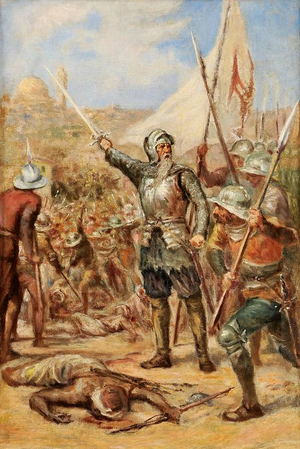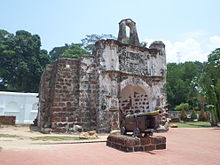
Back الاستيلاء على ملقا (1511) Arabic Превземане на Малака (1511) Bulgarian Toma de Malaca (1511) Spanish Prise de Malacca French כיבוש מלאקה (1511) HE Perebutan Melaka (1511) ID Conquista portoghese di Malacca Italian Penaklukan Melaka (1511) Malay Conquista de Malaca (1511) Portuguese Взятие Малакки Russian
| Capture of Malacca | |||||||||
|---|---|---|---|---|---|---|---|---|---|
| Part of Malay–Portuguese conflicts | |||||||||
 "The Conquest of Malacca, 1511" by Ernesto Condeixa (1858–1933). | |||||||||
| |||||||||
| Belligerents | |||||||||
|
| Malacca Sultanate | ||||||||
| Commanders and leaders | |||||||||
|
| Mahmud Shah | ||||||||
| Strength | |||||||||
|
1,500 Portuguese soldiers 3 caravels 2 galleys[4] |
20,000 men[5] Unknown number of lancaran 20 penjajap | ||||||||
| Casualties and losses | |||||||||
| 28 dead[7] | Unknown | ||||||||

The Capture of Malacca in 1511 occurred when the governor of Portuguese India Afonso de Albuquerque conquered the city of Malacca in 1511.
The port city of Malacca controlled the narrow, strategic Strait of Malacca, through which all seagoing trade between China and India was concentrated.[8] The capture of Malacca was the result of a plan by King Manuel I of Portugal, who since 1505 had intended to beat the Castilians to the Far-East, and Albuquerque's own project of establishing firm foundations for Portuguese India, alongside Hormuz, Goa and Aden, to ultimately control trade and thwart Muslim shipping in the Indian Ocean.[9]
Having started sailing from Cochin in April 1511, the expedition would not have been able to turn around due to contrary monsoon winds. Had the enterprise failed, the Portuguese could not hope for reinforcements and would have been unable to return to their bases in India. At the time it was the farthest territorial conquest in history.[10]
- ^ Bosworth, Clifford Edmund (2007). Historic cities of the Islamic world. BRILL. p. 317. ISBN 978-90-04-15388-2. Retrieved 23 August 2011.
- ^ van Gent, Robert Harry. "Islamic–Western Calendar Converter". Universiteit Utrecht. Retrieved 23 August 2011.
- ^ Subrahmanyam & Parker 2008, p. 24.
- ^ [1] Archived 27 December 2022 at the Wayback Machine Cartas de Afonso de Albuquerque, Volume 1 p. 65
- ^ Diffie & Winius 1977, p. 256.
- ^ Gibson-Hill 1953, p. 146-147.
- ^ Diffie & Winius 1977, p. 258.
- ^ The Cambridge History of the British Empire Arthur Percival Newton p. 11 [2] Archived 27 December 2022 at the Wayback Machine
- ^ João Paulo de Oliveira e Costa, Vítor Luís Gaspar Rodrigues (2012) Campanhas de Afonso de Albuquerque: Conquista de Malaca, 1511 p. 13 Archived 27 December 2022 at the Wayback Machine
- ^ João Paulo de Oliveira e Costa, Vítor Luís Gaspar Rodrigues (2012) Campanhas de Afonso de Albuquerque: Conquista de Malaca, 1511 p. 7 Archived 27 December 2022 at the Wayback Machine
Cite error: There are <ref group=Note> tags on this page, but the references will not show without a {{reflist|group=Note}} template (see the help page).